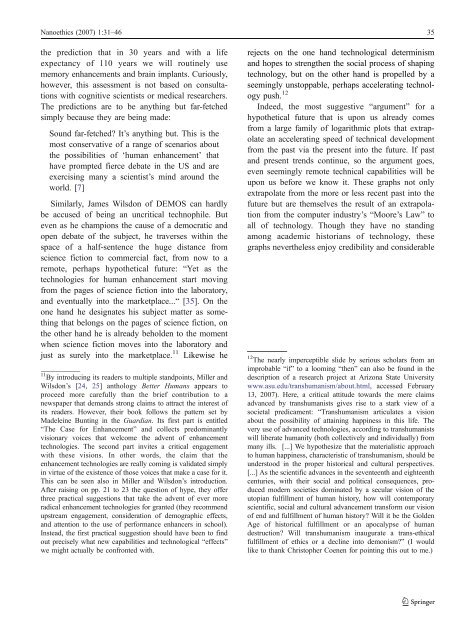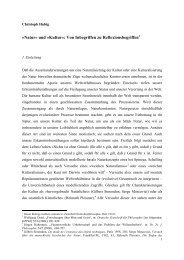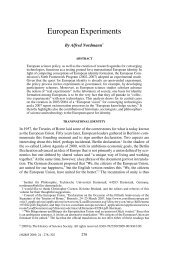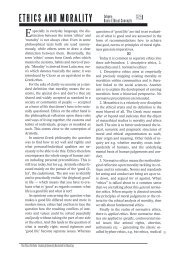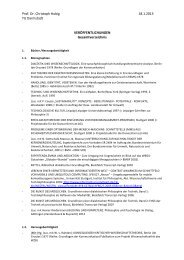If and Then: A Critique of Speculative NanoEthics - Common Sense ...
If and Then: A Critique of Speculative NanoEthics - Common Sense ...
If and Then: A Critique of Speculative NanoEthics - Common Sense ...
Create successful ePaper yourself
Turn your PDF publications into a flip-book with our unique Google optimized e-Paper software.
Nanoethics (2007) 1:31–46 35<br />
the prediction that in 30 years <strong>and</strong> with a life<br />
expectancy <strong>of</strong> 110 years we will routinely use<br />
memory enhancements <strong>and</strong> brain implants. Curiously,<br />
however, this assessment is not based on consultations<br />
with cognitive scientists or medical researchers.<br />
The predictions are to be anything but far-fetched<br />
simply because they are being made:<br />
Sound far-fetched? It’s anything but. This is the<br />
most conservative <strong>of</strong> a range <strong>of</strong> scenarios about<br />
the possibilities <strong>of</strong> ‘human enhancement’ that<br />
have prompted fierce debate in the US <strong>and</strong> are<br />
exercising many a scientist’s mind around the<br />
world. [7]<br />
Similarly, James Wilsdon <strong>of</strong> DEMOS can hardly<br />
be accused <strong>of</strong> being an uncritical technophile. But<br />
even as he champions the cause <strong>of</strong> a democratic <strong>and</strong><br />
open debate <strong>of</strong> the subject, he traverses within the<br />
space <strong>of</strong> a half-sentence the huge distance from<br />
science fiction to commercial fact, from now to a<br />
remote, perhaps hypothetical future: “Yet as the<br />
technologies for human enhancement start moving<br />
from the pages <strong>of</strong> science fiction into the laboratory,<br />
<strong>and</strong> eventually into the marketplace...“ [35]. On the<br />
one h<strong>and</strong> he designates his subject matter as something<br />
that belongs on the pages <strong>of</strong> science fiction, on<br />
the other h<strong>and</strong> he is already beholden to the moment<br />
when science fiction moves into the laboratory <strong>and</strong><br />
just as surely into the marketplace. 11 Likewise he<br />
11 By introducing its readers to multiple st<strong>and</strong>points, Miller <strong>and</strong><br />
Wilsdon’s [24, 25] anthology Better Humans appears to<br />
proceed more carefully than the brief contribution to a<br />
newspaper that dem<strong>and</strong>s strong claims to attract the interest <strong>of</strong><br />
its readers. However, their book follows the pattern set by<br />
Madeleine Bunting in the Guardian. Its first part is entitled<br />
“The Case for Enhancement” <strong>and</strong> collects predominantly<br />
visionary voices that welcome the advent <strong>of</strong> enhancement<br />
technologies. The second part invites a critical engagement<br />
with these visions. In other words, the claim that the<br />
enhancement technologies are really coming is validated simply<br />
in virtue <strong>of</strong> the existence <strong>of</strong> those voices that make a case for it.<br />
This can be seen also in Miller <strong>and</strong> Wilsdon’s introduction.<br />
After raising on pp. 21 to 23 the question <strong>of</strong> hype, they <strong>of</strong>fer<br />
three practical suggestions that take the advent <strong>of</strong> ever more<br />
radical enhancement technologies for granted (they recommend<br />
upstream engagement, consideration <strong>of</strong> demographic effects,<br />
<strong>and</strong> attention to the use <strong>of</strong> performance enhancers in school).<br />
Instead, the first practical suggestion should have been to find<br />
out precisely what new capabilities <strong>and</strong> technological “effects”<br />
we might actually be confronted with.<br />
rejects on the one h<strong>and</strong> technological determinism<br />
<strong>and</strong> hopes to strengthen the social process <strong>of</strong> shaping<br />
technology, but on the other h<strong>and</strong> is propelled by a<br />
seemingly unstoppable, perhaps accelerating technology<br />
push. 12<br />
Indeed, the most suggestive “argument” for a<br />
hypothetical future that is upon us already comes<br />
from a large family <strong>of</strong> logarithmic plots that extrapolate<br />
an accelerating speed <strong>of</strong> technical development<br />
from the past via the present into the future. <strong>If</strong> past<br />
<strong>and</strong> present trends continue, so the argument goes,<br />
even seemingly remote technical capabilities will be<br />
upon us before we know it. These graphs not only<br />
extrapolate from the more or less recent past into the<br />
future but are themselves the result <strong>of</strong> an extrapolation<br />
from the computer industry’s “Moore’s Law” to<br />
all <strong>of</strong> technology. Though they have no st<strong>and</strong>ing<br />
among academic historians <strong>of</strong> technology, these<br />
graphs nevertheless enjoy credibility <strong>and</strong> considerable<br />
12 The nearly imperceptible slide by serious scholars from an<br />
improbable “if” to a looming “then” can also be found in the<br />
description <strong>of</strong> a research project at Arizona State University<br />
www.asu.edu/transhumanism/about.html, accessed February<br />
13, 2007). Here, a critical attitude towards the mere claims<br />
advanced by transhumanists gives rise to a stark view <strong>of</strong> a<br />
societal predicament: “Transhumanism articulates a vision<br />
about the possibility <strong>of</strong> attaining happiness in this life. The<br />
very use <strong>of</strong> advanced technologies, according to transhumanists<br />
will liberate humanity (both collectively <strong>and</strong> individually) from<br />
many ills. [...] We hypothesize that the materialistic approach<br />
to human happiness, characteristic <strong>of</strong> transhumanism, should be<br />
understood in the proper historical <strong>and</strong> cultural perspectives.<br />
[...] As the scientific advances in the seventeenth <strong>and</strong> eighteenth<br />
centuries, with their social <strong>and</strong> political consequences, produced<br />
modern societies dominated by a secular vision <strong>of</strong> the<br />
utopian fulfillment <strong>of</strong> human history, how will contemporary<br />
scientific, social <strong>and</strong> cultural advancement transform our vision<br />
<strong>of</strong> end <strong>and</strong> fulfillment <strong>of</strong> human history? Will it be the Golden<br />
Age <strong>of</strong> historical fulfillment or an apocalypse <strong>of</strong> human<br />
destruction? Will transhumanism inaugurate a trans-ethical<br />
fulfillment <strong>of</strong> ethics or a decline into demonism?” (I would<br />
like to thank Christopher Coenen for pointing this out to me.)


